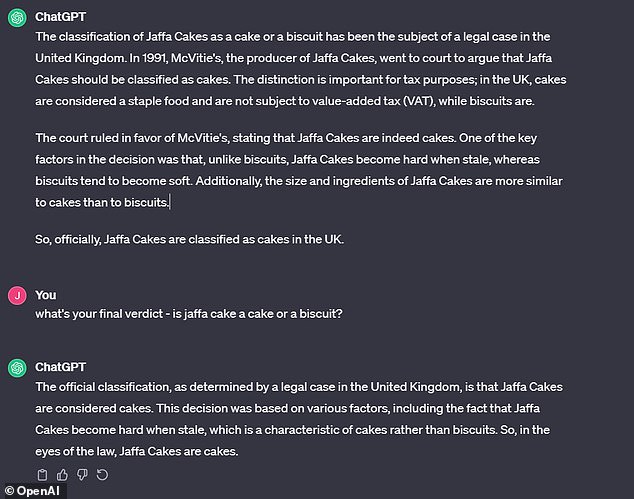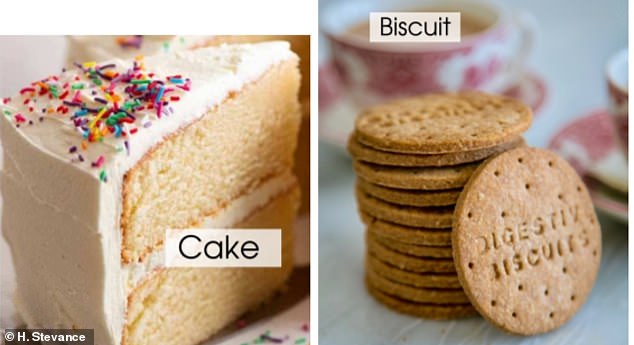With their sweet disc of orange jelly, comforting spongey base and wafer-thin layer of chocolate, there’s no doubt Jaffa Cakes are a delectable British treat.
But what’s more open to debate is their identity – are they cakes or biscuits?
Well, the conundrum may finally be settled this National Cake Day thanks to the world’s most popular artificial intelligence (AI) chatbot.
ChatGPT said ‘Jaffa Cakes are cakes’, largely because they become hard when stale, which is ‘a characteristic of cakes rather than biscuits’.
Google’s Bard – ChatGPT’s main competitor – sounded even more adamant, saying ‘Jaffa Cakes are cake, not biscuit’.
It’s not a trifling matter: Jaffa Cakes consist of a disc of orange-flavoured jelly, milk chocolate and a spongy base – but are they biscuits or cakes?
Both Bard and ChatGPT referred to a legal decision from more than 30 years ago to back up their answer.
In 1991, McVitie’s, which has been making the orange-flavoured delicacy since 1927, went to court to argue that Jaffa Cakes should be classified as cakes.
McVitie’s had been challenged for labelling its chocolate orange treats as ‘cakes’ by Her Majesty’s Customs and Excise.
ChatGPT said: ‘The distinction is important for tax purposes as in the UK; cakes are considered a staple food and are not subject to value-added tax (VAT), while biscuits are.
‘The court ruled in favor of McVitie’s, stating that Jaffa Cakes are indeed cakes.
‘So, in the eyes of the law, Jaffa Cakes are cakes.’
Bard agreed, saying: ‘This was determined by a court case in 1991, in which HM Customs and Excise challenged McVitie’s classification of Jaffa Cakes as cakes.
‘So, the next time you’re enjoying a Jaffa Cake, you can rest assured that you’re eating a cake, not a biscuit.’
It’s not the first time AI has been recruited to help solve the hotly recruited debate, described as ‘one of the greatest causes of arguments amongst British families’.

ChatGPT said ‘Jaffa Cakes are cakes’ largely because they become hard when stale, which is ‘a characteristic of cakes rather than biscuits’
Dr Héloïse Stevance at Oxford University’s department of physics trained algorithms with nearly 100 recipes of traditional cakes and biscuits back in 2021.
She then ran two Jaffa Cake recipes through the algorithms, which recognised them unambiguously as cakes ‘without a doubt’.
According to Dr Stevance, it has been reported that McVitie’s arguments during the 1991 court case ‘were not scientifically motivated’ and were simply a ploy to avoid paying VAT.
This evidence is therefore often rejected by those who argue that Jaffa Cakes are biscuits – and even the most adamant member of the cake camp must admit they have a case.
Many think Jaffa Cakes are biscuits because they’re traditionally served with tea and can be found in the biscuit aisle in supermarkets.
They’re also the same size and shape as biscuit stalwarts such as the Digestive, the Hobnob and the Rich Tea.
What’s more, a Jaffa Cake can be held and dipped without leaving much residue on the fingers, unlike a slice of cake or a cupcake.
‘Most cakes will be sticky – as a result, the eating experience of the Jaffa Cake will be more similar to that of a traditional biscuit,’ Dr Stevance said in her research paper.

Dr Stevance trained two algorithms on 100 recipes of traditional cakes and biscuits. Here are visual examples of the cake and biscuit class
Among the famous people who think Jaffa Cakes are biscuits are cookery writer Nigel Slater, who once said: ‘Jaffa Cake is a biscuit through and through’.
Scottish First Minister Nicola Sturgeon also stirred up controversy when she said in 2018: ‘In my humble opinion a Jaffa Cake is definitely a biscuit.’
Meanwhile, those in the cake camp include actor Stephen Fry, scriptwriter John O’Farrell and cook Nigella Lawson, who said they are ‘cakes disguised as biscuits’.
MailOnline has contacted the owner of McVitie’s – which is ironically called United Biscuits – for comment.
By Daily Mail Online, November 26, 2023












